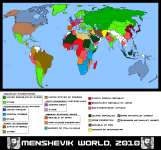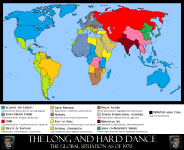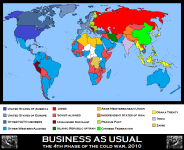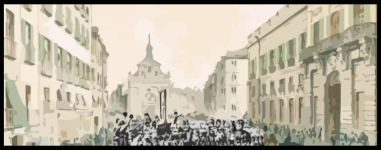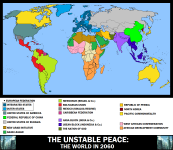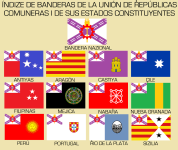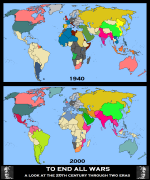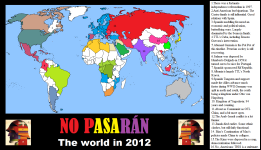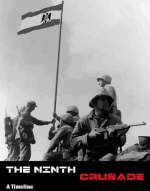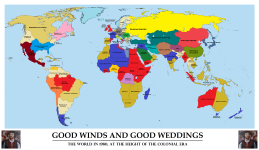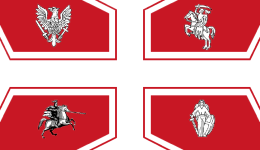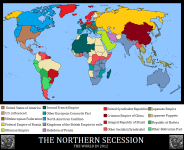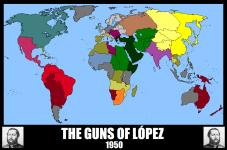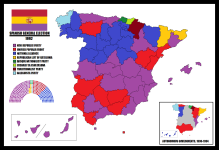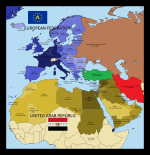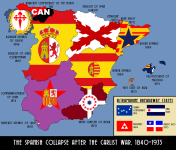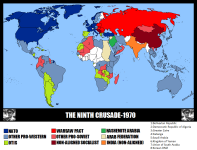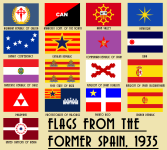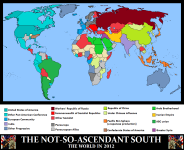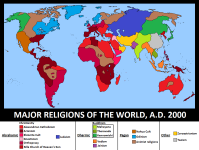Menshevik World
This map is the result of my confrontation with a recurrent AH tendency: Russia always gets the short end of the stick, and when it doesn't, it takes the shape of an Evil Empire of sorts.
In this world, due to a mechanical fail, Lenin's train blew up before he could publish the April theses, with the result of the Russian Revolution being taken over by the Menshevik faction, which dedicated to a rather different programme: setting the institutions of a Russian bourgeoise democracy (with the constitutional democrats as a tolerated opposition) while encouraging the syndical movement and dedicating to the improvement of the worker's conditions, which, they hoped, would lead to the worker's enlightement and a Socialist revolution when the time would come.
In short, they set a social democratic system. Just that ITTL isn't called that, but just Socialism, in the old, Marxist sense.
That led to a rather different interwar ideological atmosphere. For a start, the Bolshevik faction separated itself from the 2nd international as a fringe movement, and would prove itself a rather popular inspiration for third-worldist guerrillas. Fascism still emerged in Italy, but Hitler was assasinated ITTL before the Munich coup (upheavals in Germany taking a different form), And a different-shaped German Völkisch Freedom Party became the rising star of German Fascism in the early 30s. In spite of a diplomatic crisis after an alt-Sudetenland annexation, it never got beyond there, and there was no WWII. Also, Anarchism did much better in Spain ITTL, to an extent there was a short but pivotal civil war between Anarchists and Republicans, after which the Spanish Republic was put under a "special circumstances" Conservative junta that reverted all the Republic's former measures.
France, after strong political convulsions in the 30s and early forties, underwent its own socialist revolution (they didn't join the International due to France being, as the general-secretary Camus pointed out, "already building a socialist stage, not paving the road to it" Yeah, sure, that's the reason). The short civil war that came was mostly fought in Africa, which made easy for the socialists to present themselves as the Liberators of the Opressed Africans. It's just that the Algerians and the Mauritanians, with clashing traditions being used as an excuse for colonial atrocities, ultimately didn't buy it. France's system is not Communism as we know it: it borrows a lot from the Anarcho-Syndicalist ideary and it as a quite left-libertarian discourse, but at the same time has as much unilateralism and no-love-for-dissent as one could expect.
Japan was a most weird case. Mao died much earlier ITTL, and the struggles between the Communists and the KMT, as well as the prudence of not attacking the United States, allowed Japan to carve out their mainland empire... just to find themselves rotten with a stagnated economy and dozens of insurgence focuses. In the late 60s a reformist thought emerged, with a strange mix of dharmic philosophy applied to Japanese traditions, bolshevism, and the same old imperialist militarism with one cup of humanitarian bona fide and two cups of racist condescendence. The ideology (wich could be roughly translated as "obliteration of the self") changed the face of the Empire. More exactly, now it has the kind of face that gets stamped by a boot forever...
The British Empire successfully reformed into a commonwealth bound by the Sterling Pound, but lost India (in a much nastier way). The German regime became unpopular in the fifties and was replaced by a "democratic" (more like "plain old militarist conservative") coup. the Italian Empire imploded in the 60s, after the power vacuum led by Mussolini proved unsolvable, and the Socialist and Communist guerrillas started to get strong in the Mezzogiorno. The Spanish justa ultimately stepped out, and a nasty Basque issue got solved by an independence referendum. The United States recovered from the Great Depression much slower and mass consumer society never fully catch on (the mainstream discourse being one of almost Randian triumphalist social darwinism). Afghanistan, Iran and part of the Arab world have gone throught the path of secularization and Westernization against a perceived Russian Offensive. Much of South America is under a net of Operación Condor-like military juntas.
It's 2010, and most Socialist nations have pretty much abandoned the idea of a Socialist revolution altogether, as the living standards standards have made it unnecesary. The mainstream (2nd International) lecture is that Social Democracy *is* by itself a Proletarian dictatorship: A system in which "the proles" have a private car, a bank account, a personal computer and summer vacations, where they constitute the main electoral force and the main rank where politicians come from in a state with participation in most resources, what else could be? The Western nations other than France, turned off by Marxist discourse, had followed a much more jingoistic and Libertarian-Conservative path. Things didn't go down the gutter in the United States and other like-minded nations in great part because worker's unions became giants capable of competing with the robber barons in a much more manufacture-oriented country, if that meant said unions became something of a robber baron themselves.
With an impressive living standard and freedom records, as well as an intimidating military force and as the leaders of the most relevant international organization, The United Russian Republics are the only superpower deserving of such a name, and in spite of political hostilities that never went as far as IOTL, Russian arts and literature are renowned everywhere: though there is not a single lingua franca, every cultivated person, no matter their bithplace, is expected to be fluent in Russian.
The world is a bit more backwards than OTL (10 to 15 years), but there is much more investment in outer space, and the Internet equivalent is about as developed as IOTL. On a curious note, due to the greater reputation of Marxism, Secularism and social Darwinistic theories of many kinds, Atheism is much more prevalent almost everywhere.
